July 26, 2017

A study published in Psychological Science, a journal of the Association for Psychological Science, found that people in richer and poorer countries have different levels of life satisfaction and meaning.
In general, life satisfaction was substantially higher in wealthy nations than in poor nations, but meaning in life was higher in poor nations than in wealthy nations. Satisfaction results from having better “objective living conditions” according to the authors.
People in wealthier nations were more educated, had fewer children, expressed more individualistic attitudes, and were less religiously observant compared to those in poorer countries -- all factors that were associated with higher life satisfaction but a significantly lower sense of meaning in life. Richer countries also had higher suicide rates than poorer countries.
The role of religion, especially in poorer countries seems to be the most important factor for developing a sense of meaning in life. More than education, fertility rates, social networks and relationships. People in poorer countries have less resources, more economic stresses, and more personal difficulties in their lives. These adversities are thought to foster a greater need to look and explore religion for deeper meanings and answers to life's questions.
https://www.sciencedaily.com/releases/2013/12/131218100139.htm






